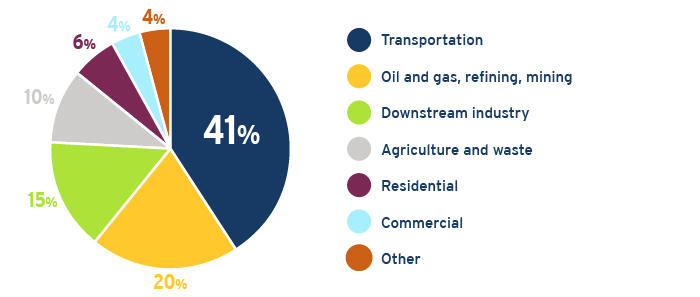Benefits of natural gas-fuelled vehicles
We’re working to reduce emissions by helping customers transition from heavier-carbon fuels like diesel to lower carbon1 fuels like compressed natural gas (CNG), liquefied natural gas (LNG) and Renewable Natural Gas2 (RNG).
B.C.’s greenhouse gas (GHG) emissions by sector

Source: Pathways for British Columbia to achieve its GHG reduction goals; Guidehouse, 2020, p11.
At 41 per cent of provincial GHG emissions, transportation accounts for the largest emissions footprint in B.C.3 With so much room for improvement, we’re excited to be offering CNG and LNG as cost-effective solutions to help lower emissions when compared to gasoline and diesel.
Emissions reductions: fuelling with LNG or CNG compared with diesel or gasoline3
- GHG emissions: Natural gas vehicles can emit up to 30 per cent fewer GHG emissions.
- Nitrogen oxides (NOx): Natural gas vehicles emit up to 95 per cent fewer NOx.4
- Particulate matter: Natural gas vehicles emit virtually no particulate matter.4
Emission reductions: fuelling with RNG compared with diesel or gasoline
- GHG emissions: RNG can reduce GHG emissions by up to 20 to 30 per cent when replacing the combustion of conventional diesel fuel.4
- Nitrogen oxides (NOx): Natural gas vehicles emit up to 95 per cent fewer NOx.4
- Particulate matter: Natural gas vehicles emit virtually no particulate matter.4
Looking forward: fuelling with hydrogen
We're investing in future solutions for our customers for potentially even greater emission reductions. Learn more about hydrogen's exciting potential as a lower carbon energy option
1When compared to the lifecycle carbon intensity of conventional natural gas. The burner tip emission factor of FortisBC’s current Renewable Natural Gas (also called RNG or biomethane) portfolio is 0.27 grams of carbon dioxide equivalent
per megajoule of energy (gCO2e/MJ). FortisBC’s current RNG portfolio lifecycle emissions for stationary combustion are -22 gCO2e/MJ. This is below B.C.’s lifecycle carbon intensity threshold of 30.8 gCO2e/MJ as set out in the 2024 Greenhouse Gas Reduction Regulation amendments.
2Renewable Natural Gas (also called RNG or biomethane) is produced in a different manner than conventional
natural gas. It is derived from biogas, which is produced from decomposing organic waste from landfills, agricultural waste and wastewater from treatment facilities. The biogas is captured and cleaned to create RNG. When RNG is added to North America’s
natural gas system, it mixes with conventional natural gas. This means we’re unable to direct RNG to a specific customer. But the more RNG is added to the gas system, the less conventional natural gas is needed, thereby reducing the use of fossil
fuels and overall greenhouse gas emissions.
3Pathways for British Columbia to achieve its GHG reduction goals;
Guidehouse, 2020, p11.
4Northwest Gas Association, Natural gas facts, page 15
BC carbon credits
Carbon credits
Since natural gas is a lower carbon fuel than gasoline or diesel, making the switch from those fuels to natural gas means you could be eligible for carbon credits, which you can sell. How does this process work?
- We send you an annual report of your natural gas fuel usage for the year. You submit this information to B.C.’s Ministry of Energy, Mines and Low Carbon Innovation.
- The Ministry determines whether or not to validate your credits.
- If validated, you can sell those credits via the credit market, or via a broker.
Learn more about the B.C. government’s Renewable and Low Carbon Fuel Requirements Regulation.
Questions? We’re here to help.
Email us at [email protected]